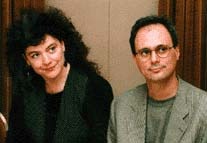
Documentary | Filmmaking | Interviews
Beyond ‘Troublesome Creek’
Written by Tiffany Patrick | Posted by: Anonymous
TP: I understand Jeanne is finishing up a project, anything she wants to discuss with NewEnglandFilm.com?
JORDAN: I have just finished editing "The Blue Diner," a dramatic feature shot here in Boston. It was produced by Natatcha Estebanez and directed by Jan Egleson. It’s a wonderful bilingual (Spanish/English) story that Natatcha and Jan wrote together. Initially I was just going to cut a funding sample but really fell in love with the film and just kept going. We just finished mixing it and I’m so proud of it. Editing will always be my first love — both documentary and dramatic. These days I prefer doing our own projects but I couldn’t resist "The Blue Diner."
TP: How about you Steve? Are you working on a project at the moment?
ASCHER: We’ve usually got a number of different things going at once. As for long-term projects, we’ve just started a project about the Heywood family in Newton. Stephen Heywood is a craftsman and builder who was diagnosed with Lou Gehrig’s disease (ALS), which is what Jeannie’s mother died of. His brother, Jamie quit his job in California, moved east and together with Stephen’s wife, Jamie’s wife, their parents and others have started a research foundation to expedite ALS research. They are an amazing family doing an amazing thing. They were profiled in the New Yorker [Magazine] and on "60 Minutes," and a lot of people have been following their progress.
TP: While we’re on the subject of current projects, I’d like to back up a moment and talk about ideas. Where do you get your ideas for projects?
ASCHER: We do lots of different kinds of projects. Some are feature-length films, like "Troublesome Creek." In the past couple of years we’ve done a number of short-form projects for TV, including feature pieces for the NewsHour with Jim Lehrer and projects about art and artists for Greater Boston Arts on PBS. The initial idea for the larger projects comes from us, the others are sometimes our ideas or ideas of the executive producers, correspondent or others we’re working with. We have pretty wide ranging interests, and lots of times we find that things that come from one project can be applied to another. It could be story ideas from a documentary project that feed a dramatic script, or editing tricks or shooting styles.
TP: How many ideas do you throw out before settling on one?
ASCHER: We go often go through a lot of ideas before settling on one. I think one rule we have is to not take on a project unless we’re genuinely interested in it. If I can’t find something in the topic or the project that’s truly interesting to me, I don’t think I can do a good job on it. We tend to invest a lot in trying to bring out what’s intriguing in a subject, things that audiences don’t necessarily expect to find interesting before they see it, and to do that you have to feel yourself that there’s something special in there.
TP: Okay, now let’s test that. I have been working an idea over for years. It’s to produce a documentary series about Pain — the history and culture of pain. What’s your critical analysis of this idea? Does it have "the right stuff" in your opinion? Go ahead, I can take it.
JORDAN: I can see why you’d be interested in it. But I would say to you what someone once said to us: Beware the double D’s — Documentary and Depressing. If you’re doing something that people feel will bum them out you have to disprove them very quickly. I’m not quite sure how you’d do that with "Pain."
TP: Let’s say you have an idea for a documentary film. How do you analyze an idea? Surely not every idea has "the right stuff." What is the right stuff?
ASCHER: I don’t think there’s one set of criteria that applies to all types of projects. Looking back on, say, "Troublesome Creek" we started off making a film that had a lot of personal meaning – the end of an era in Jeannie’s family, what looked like the last year her dad might farm. As filmmakers it was an incredible opportunity to be very close to something with so much meaning. We wanted the film to be personal, but also to look in broader terms about the farm crisis and about an important moment in history – the end of family farms. And we wanted it to be funny! It’s not like you know what a film is really going to be before you make it, so I don’t know how much "analysis" of the idea really comes into it. But we were very happy that "Troublesome Creek" managed to be personal, emotional, political and, at moments, funny.
TP: Can you give us an example of an idea that didn’t quite make it?
JORDAN: Starting a few years ago, we wanted to do a film with a producer friend on Carson McCullers, a writer I have always loved. Unfortunately there wasn’t an enormous amount of funding potential and I think Steve and I were so worn out by the slog of getting "Troublesome Creek" out there that we couldn’t bear starting over. But when we have projects we really like they don’t disappear they just move to a back burner. I still think about the Carson project a lot and hope we can do it someday.
TP: Do you typically start a project with an ending in mind? How do you know when to turn the camera off? Do you find it difficult to turn the camera off?
ASCHER: Again, the answer depends on the project. When you’re filming real people living their lives, as we were with the Jordan family or will be with the Heywoods, you try to film the things that seem interesting with some idea of how the scenes might go together, but you can only plan so much. Things that seemed trivial often take on whole new meanings in the editing room.
On the other hand, with the short-form projects we’ve been doing, you have to figure out very quickly where it’s going, how it will start and end, and you only have time to shoot things that stay very close to that through-line.
As for turning off the camera, it runs the gamut from "Troublesome Creek" where we were shooting 16mm film with no money and had to nurse 10 minutes of film stock through an entire evening of shooting, to recent DV shoots where the tendency is to just keep shooting because the tape stock is so cheap compared to all the other costs. Shooting tape takes a lot of pressure off, but there’s a way that film forces you to concentrate and execute things better and you probably end up with better footage in the editing room.
TP: Do you two prefer working together or separately?
ASCHER: We love working together and we also like doing separate projects at times. This year, aside from the things we’ve done together, Jeannie has been editing The Blue Diner for several months and I’ve directed some dramatic corporate projects, done an interactive museum installation and a project for the web. I think we both learn things when we’re out working with others that we bring back to the stuff we do together.
JORDAN: Also, work can get very intense, and when you work together, you’re both in that intensity at the same time and of course also dealing with home life, and raising our son. When we work apart, hopefully at least one of us is more relaxed at any given time.
TP: How do you divide roles?
ASCHER: Depends on the project. On "Troublesome Creek," we both produced, directed and wrote, I shot and Jeannie did sound and edited. Since then I stopped doing camerawork. On several things recently, we produced together, I directed with a hired crew and Jeannie edited.
TP: What kind of correspondence did you get from people after "Troublesome Creek" aired? Does any one comment or reaction stand out in your mind?
JORDAN: We got and still get lots of correspondence. What we find more remarkable, though, is how much my dad gets. Probably our favorite is the time two-tour busloads of Australians pulled up in front of his house in Atlantic, Iowa for a picnic on the banks of "Troublesome Creek."
TP: Are you still learning things as a filmmaker?
ASCHER: I was just having a lunch with some good friends who are filmmakers and we were trying to figure out if we felt any more confident about our filmmaking as we’ve gotten older. No matter what the project, there always seems to be a battle between the feeling that what you’re shooting isn’t good enough or won’t work or the project will flop, and some kind of confidence that somehow you have the ability to make it work. I think Jeannie and I are both very superstitious and tend to doubt things until the last minute, and then finally allow ourselves to enjoy the things that are working.
JORDAN: Or not! I’m still not totally convinced anything I’ve ever done actually works!
ASCHER: That feeling that you could have done it better never goes away. You look back after it’s done, wishing you could just go back and fix something, or a lot of things. So you keep trying to get it right. At the point that you feel like you have nothing left to learn you’ve probably become either God or a hack. Since the first ain’t too likely, you do what you can to avoid the second.
Jeanne Jordan has co-produced and directed Running With Jesse for 'Frontline.' She edited two films for the series 'Eyes on the Prize: America's Civil Rights Years,' and several dramas for American Playhouse. Steven Ascher's films include 'Del and Alex' and 'Life and Other Anxieties.' He co-wrote The Filmmaker's Handbook with Ed Pincus, and has taught filmmaking at MIT. To purchase a copy of 'Troublesome Creek' go to BuyIndies.com.









